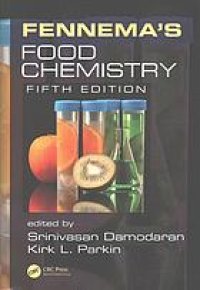
Ebook: Fennema's food chemistry
- Tags: Food -- Analysis., Food -- Composition.
- Year: 2017
- Publisher: CRC Press
- City: Boca Raton
- Edition: Fifth edition
- Language: English
- pdf
This latest edition of the most internationally respected reference in food chemistry for more than 30 years, Fennema’s Food Chemistry, 5th Edition once again meets and surpasses the standards of quality and comprehensive information set by its predecessors. All chapters reflect recent scientific advances and, where appropriate, have expanded and evolved their focus to provide readers with the current Read more...
Abstract: This latest edition of the most internationally respected reference in food chemistry for more than 30 years, Fennema’s Food Chemistry, 5th Edition once again meets and surpasses the standards of quality and comprehensive information set by its predecessors. All chapters reflect recent scientific advances and, where appropriate, have expanded and evolved their focus to provide readers with the current state-of-the-science of chemistry for the food industry. This edition introduces new editors and contributors who are recognized experts in their fields. The fifth edition presents a completely rewritten chapter on Water and Ice, written in an easy-to-understand manner suitable for professionals as well as undergraduates. In addition, ten former chapters have been completely revised and updated, two of which receive extensive attention in the new edition including Carbohydrates (Chapter 3), which has been expanded to include a section on Maillard reaction; and Dispersed Systems: Basic considerations (Chapter 7), which includes thermodynamic incompatibility/phase separation concepts. Retaining the straightforward organization and accessibility of the original, this edition begins with an examination of major food components such as water, carbohydrates, lipids, proteins, and enzymes. The second section looks at minor food components including vitamins and minerals, colorants, flavors, and additives. The final section considers food systems by reviewing basic considerations as well as specific information on the characteristics of milk, the postmortem physiology of edible muscle, and postharvest physiology of plant tissues